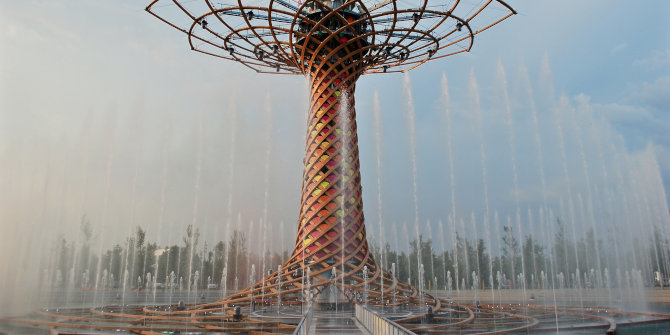Countries bordering Ukraine have been widely praised for showing generosity to Ukrainians fleeing the Russia-Ukraine war. Yet, as Iliana Sarafian argues, attitudes toward Ukrainian Roma refugees have often been far less welcoming than for other citizens.
Prior to Russia’s invasion of Ukraine, there were approximately 400,000 Roma living in the country, with the largest populations concentrated in regions heavily affected by the war, including Odessa, Donetsk and Kharkiv. While it is difficult to measure how many of these people have left the country since the war began, conservative estimates indicate that at least 100,000 Ukrainian Roma have fled Ukraine due to the conflict. Many of these have crossed the border into Poland.
Ukrainian Roma already experienced social inequality, stigma and discrimination prior to the war. These problems have been exacerbated first by COVID-19 and now by being forced to flee the conflict. Recent research we have conducted, which featured interviews with Ukrainian Roma in Poland, provides some insights into their experiences.
Our respondents indicated that the only sense of security that could be found amidst forced migration and loss of livelihoods was by staying close to their families. In the words of one woman aged in her fifties, “I stick with my family. Who else can I trust? I am foreign, I am dark, I don’t speak the language. It is my family, my children whom I trust, no one else.”
Roma refugees’ sense of insecurity results in them seeking safety in numbers. They tend to remain in larger groups, mainly women and children, as a source of security. Being together with close and extended family presents a mechanism for countering discrimination, where family members, including elderly and young children, can care for each other.
Misunderstandings
This highly visible feature of Roma refugees is mostly misunderstood by aid providers as a cultural issue. It is rarely seen as a safety mechanism. This has been problematic at border crossings and refugee reception centres. From our conversations with NGOs, local authorities and volunteers, the accommodation of larger Roma families was seen as the main challenge in providing more permanent forms of accommodation to Ukrainian Roma. As a result, they were more likely to stay in temporary reception centres and facilities.
In fact, most of the Roma people in the largest reception centre in Poland had stayed there for longer than three months, with some going back to Ukraine and then coming back to Poland again. To deal with this issue, Ukrainian Roma are often referred for help to Polish Roma activists and volunteer groups to take responsibility for the “collective nature” of their needs, including dealing with their cultural and linguistic needs.
At one reception centre outside Warsaw in Poland, Roma accounted for the predominant group of refugees and the local volunteers were concerned that any temporary accommodation offered to them would become permanent. Most of these refugees remained there for at least three to four months, at a reception centre designed for temporary stays of just two or three days.
The centre is particularly ill-suited to the needs of children as it is next to a busy road and can only offer temporary provision of education and medical facilities. Despite this, the centre had become synonymous with Roma people in the imaginations of local people and non-Roma refugees. A lack of information from the authorities, organisational chaos, linguistic and cultural barriers, and above all the high levels of stress among all refugees had produced a sense of crisis where the needs of both local people and refugees were not being met.
Undeserving kinship
The perception that Roma families present a problem due to the supposedly unmanageable scale of their requests for refugee support is an expression of racism, stemming from the failure to view Roma refugees as Ukrainian citizens. They are viewed as a people that do not belong to either Ukraine or Poland and are therefore not real refugees and are not in real need of support.
The large Ukrainian Roma groups are linked in people’s minds to racialised visions of “Gypsiness”, a historic misrepresentation of Roma vagrancy. In the words of one Ukrainian Roma, “They see us gathered on a mound together and what do you think they see? People who have come to do bad, not people needing help”.
Unfortunately, what is happening in Poland is not unique. Similar anti-Roma refugee sentiments and practices were documented during the onset and the aftermath of the Balkan wars, where Roma refugees were expelled from their hometowns and fled to western Europe only to be forcibly returned and to find that their homes no longer existed.
To date, thousands of Roma from the former-Yugoslavian countries and their descendants live in Italy, often in segregated, informal or formal camps, including settlements known as “nomad camps”. Roma are regularly treated differently because they are seen as outsiders, criminals, vagrants and “a menace”. The experience of Ukrainian Roma refugees in Poland shows how this social bordering and exclusion intersects with racialisation to create ideas of selective solidarity. This has created a new category of refugees who are perceived as undeserving of support.
This article is based on research conducted as part of the “Unwanted Strangers” research project supported by the British Academy and hosted by LSE’s Centre for Public Authority and International Development at the Firoz Lalji Institute for Africa.
Note: This article gives the views of the author, not the position of EUROPP – European Politics and Policy or the London School of Economics. Featured image credit: Grand Warszawski/Shutterstock.com





Thank you for your insight Iliana. As a volunteer in Bulgaria working in schools, the discrimination I witness towards the Roma community is pratically boundless. The idea that all Roma are thieves is so ingrained in students that racism pervails outspokenly inside classrooms. Coincidently, I have met Roma youth that find themselves obliged to skip school for months at a time to support their families during harvesttime. It is dismaying, how this prejudice and lack of opportunities can be heightened when the refugee status is added to the equation. If I may ask, during your fieldwork among Roma communities in Bulgaria, did you find pratical solutions to increase tolerance or reduce such bias?